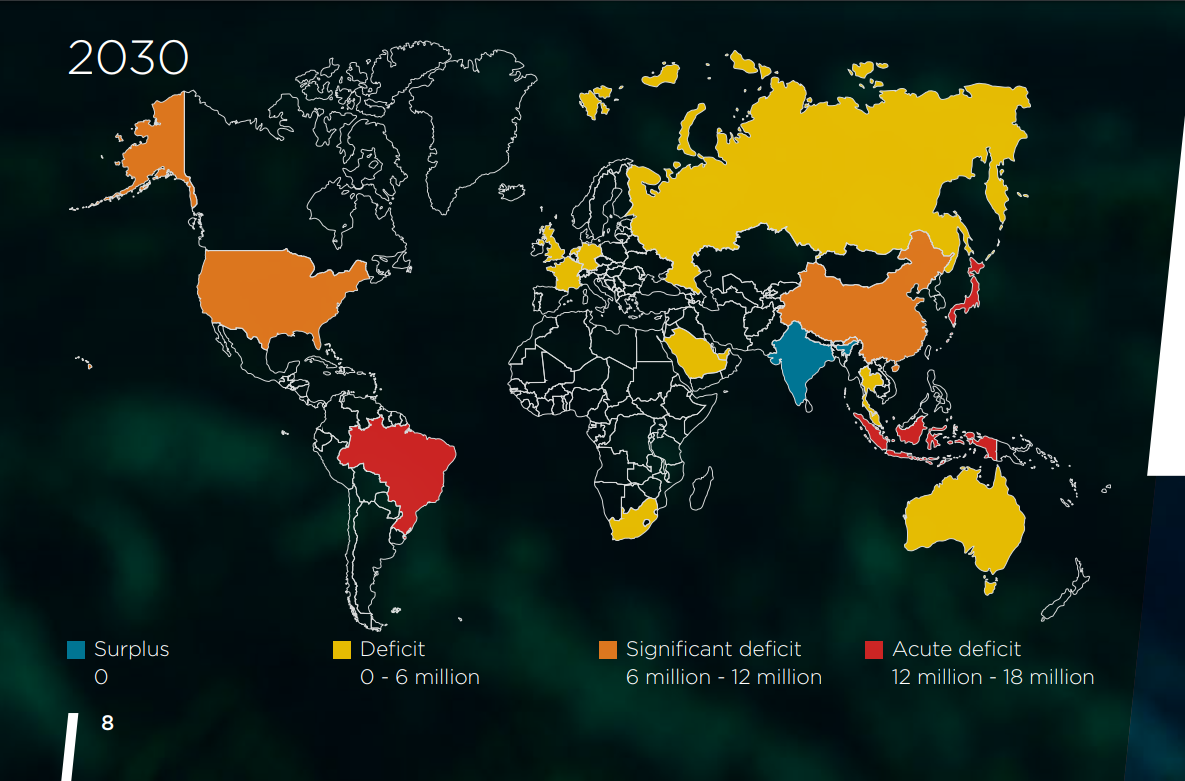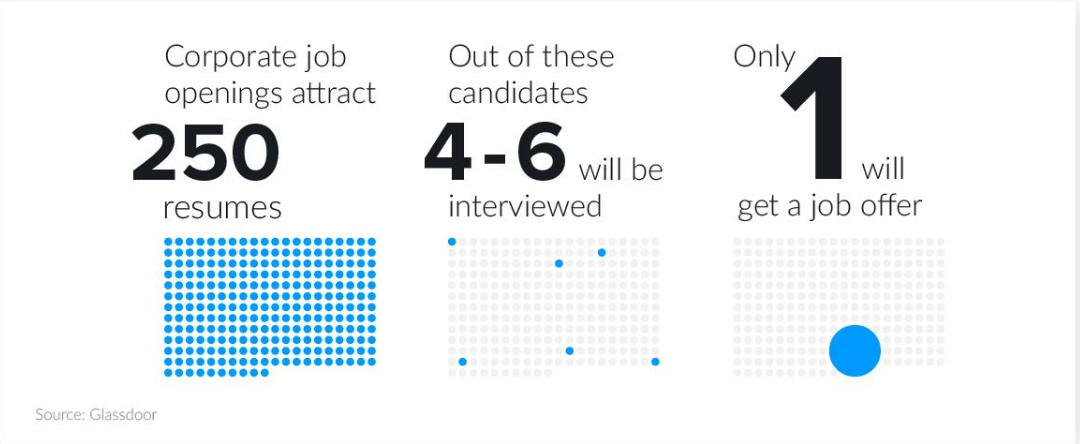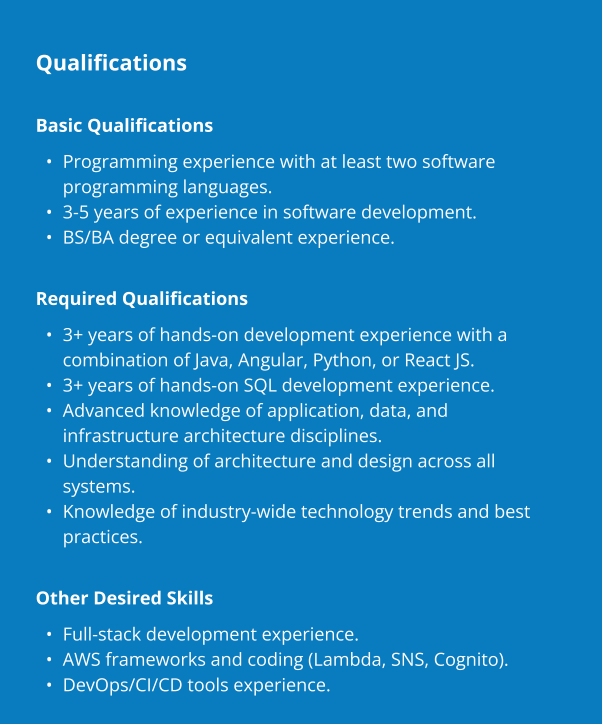
Quick Summary:
Want to learn how to interview remote software developers? Here is a blog for you. In this blog, we have covered steps for interviewing remote developers, provided guidance on what to consider when evaluating candidates, and included helpful tips for hiring remote developers.
In the IT sector, outsourcing is not new. Though it became popular during Covid-19, this trend has yet to fade.
But why?
Tech talent crunch and economic slowdown in most Western economies are why companies today hire remote developers.
According to the Korn Ferry report, there may be over 85 million unfilled jobs by 2030 due to a shortage of skilled workers.

The heat maps show the expected intensity of labor shortages across the economies by 2030.
Countries like the US, UK, Germany, France, and Japan are experiencing acute shortages resulting in highly inflated resource pricing. A survey of 1,000 business leaders in the UK revealed that approximately €7.6bn is spent yearly on bloated salaries, temporary staffing, recruitment fees, and training.
Adding salt to the injury is the economic slowdown many Western countries face today. According to the World Bank - "2023 global growth to slow to 1.7% from 3% expected six months ago."
To simplify, the tech talent crunch in Western countries has raised resource prices. But the slowdown has decapitated companies' ability to hire expensive resources.
Hence, hiring remote developers has emerged as one of the most viable solutions to counter the effect of the tech-crunch and economic slowdown. It provides you access to the global talent pool. You can hire remote programmers from countries like India, China, Mexico, and Brazil, which offer a large pool of skilled resources at economical pricing.
Hiring remote developers empowers businesses to build flexible, agile, and resilient teams while saving big on development costs.
Read our blog to explore how your business can benefit from hiring a remote developer.
Key Takeaways
- Hiring remote developers is a crucial strategy to counter the effect of the global tech crunch and economic slowdown.
- To find the right resource, companies should meticulously follow the steps to interview remote software developers.
- Factors such as technical expertise, educational background, hands-on experience, and cultural fitment should be considered while hiring remote developers.
For successful remote operations, finding programmers that fit your business requirement is pertinent.
I have written this blog to help you create a strong screening and selection process. It elaborates on how to interview remote software developers, factors to consider when screening candidates, and top tips for hiring remote developers.
So let's dive in.
Steps to interview remote software developers
Interviewing a remote developer is not the same as interviewing a candidate in person. There are numerous factors to be considered before you initiate the interview process. The steps can be classified into three phases.
Phase 1- Pre-interview preparation
Before interviewing a developer, you must create a conducive environment to interview remotely. For that, you must have a clear vision of why you want to hire remote developers, who will be part of the hiring process, and how the interview will be conducted.
Let us explore the step-by-step process for the same.
1. Setting Up Goals
The first step is to define the purpose of hiring a remote developer. You need to define the objectives of hiring a remote developer.
- Will the candidate work on a single aspect of a project to manage the entire work?
- What will their operations look like on a normal day?
- What technical skills and expertise should they bring on board?
- What attributes should be considered when assessing their communication and people skills?
The HR team should have answers to these questions. It will help them outline the skills, experience, and qualifications required for the role and thoroughly review resumes, cover letters, and portfolios to shortlist candidates and find the right match.
2. Establishing Remote Job Interview Process
Once you know who you will be interviewing, it is time to create the interview process. In this step, you need to define how many rounds of interviews will be conducted for the opening and who will be part of the interview team.
The interview rounds vary according to the seniority of the position.
For a junior developer with 0-3 years of experience, job responsibilities are simple and limited to the execution of solutions, testing, debugging, and quality assurance.
Hence you may only have 3-4 rounds of screening, including a preliminary interview, a tech skill assessment task, and a final interview.

For a mid-level remote developer with 3-5 years of experience, the job responsibilities become more complex. They are accountable for solving technical problems with unknown solutions.
Thus more rounds of interviews are added to the hiring process.

For senior developers with 5+ years of experience, the work responsibilities comprise solving complex and ambiguous problems and understanding business-level implications while managing the project team.
So, senior developers' interviews can go up to 5-7 rounds, depending on the job requirement.

3. Finalizing Interview Team
Once you have finalized the interview process, it is time to select your interview team. The interview team refers to the members who will interview a remote developer.
The team members would depend on the seniority of the position you are hiring for.
To hire remote developers at a junior level, you would probably involve the HR and the tech lead or manager under whom he/she would be working.
For a mid-level developer, you would align an HR, Tech-lead, Project manager, and CTO.
For a senior developer, you must align an HR, Project manager, CTO, and CEO.
4. Technical Tools Setup
For interviewing developers, having the right technology in place is necessary to ensure a smooth and positive interview experience for yourself and the candidate. It helps avoid any potential technical issues that could arise proactively.
To avoid any embarrassing situation of creating a bad first impression, ensure that you have the latest version of collaboration tools and remote interviewing software. Send out the meeting links in advance to the respective candidate. Test the tools with internal teams before initiating the interview to ensure they are working properly.
5. Prepare An Interview Script & Questionnaire
As an interviewer, it's essential to come prepared with a well-written script. This should include a strong introduction to your company and the position you are hiring and a comprehensive list of questions tailored to the developer position.
You can always add follow-up questions based on answers provided by the candidates. But having a script will ensure you conduct a professional and effective interview.
6. Confirmation From the Candidate
When interviewing software engineers for a remote position, understand that your remote developer may not operate in the same time zone as you. So you must acknowledge the time difference and schedule the interview at a feasible time for you and the candidate.
Also, make sure that you take confirmation on the availability of the candidate before sending out an e-meeting invitation.
Recommended Read: In-House vs Remote Developers: Pros and Cons
Phase 2- During the Interview Process
Here are the steps to carry out a seamless and successful interview to hire remote developers.
1. Interview Planning
When conducting an interview remotely, it is important to create a plan to use the time efficiently. Doing so shows that you value your and your candidate’s time and creates a good first impression.
Split the interview into introductory, technical, and industry-related questions, answer candidates’ queries, and share your feedback. Set a time limit for each section to ensure you finish the interview on time and have relevant information for further action.
2. Trust Building
When interviewing remote developers, it is a good practice to start by introducing yourself and your profile in the organization. Asking candidates about their well-being and thanking them for making time for the interview.
Give them a brief on what the organization does, the team they will work with, and their work responsibility if selected. This helps in creating a rapport and puts the candidate at ease.
3. Conduct the Interview in A Non-disruptive Environment
Make sure you choose a noise-free, well-lit room for conducting the interview. You want to avoid unnecessary distractions during interviews to ensure you and the candidate can concentrate completely. Make sure to mute all unnecessary notifications, and choose a cabin away from the work floor.
4. Give space between questions.
Once you have asked the question, give time to the candidates to process it and share their answers. Wait for a few seconds before asking the next questions to ensure that candidates have completed their answers and have nothing more to add. Be empathetic and encourage them to answer openly.
5. Align a Technical Test
A technical test is crucial for hiring a remote developer. A technical test gives you a real insight into their knowledge and expertise. To test the coding ability of candidates, you can use GitHub or Google Docs. Depending on the skills you want to evaluate, you can ask them to optimize code, create a module, or debug existing code. All you need to do is create a document and clearly outline the problem. Then, ask them to write the code.
5. Include Interview Team Members
Software development is a technical opening. So if you are wondering how to interview software engineers? The answer is to include technical experts in the interview process. Align the right technical expert in each round of interviews to ensure that the selection process is thorough and efficient.
Phase 3- Post-interview
Irrespective of whether the developer is selected or not, you don't want them to have a bad impression of your company. Here are the steps you should take to create a positive image.
1. Provide Feedback
Once the interview ends, give detailed feedback to the candidate on what was right and what could be improved. This helps in understanding their knowledge gaps and planning better for the future. Guide them on how they can enhance their skills, and suggest articles and courses if you can.
2. Share the Next Course of Action
On completing the interview, tell candidates what the next action will be. Explain how many interviews will be conducted in the future and who will be part of those discussions.
If you need time to evaluate their profile, communicate by when they should expect a reply. If they are not selected for further interviews, communicate the reason.
Providing transparency in the process creates a favorable image for your company. Remember creating a good relationship with candidates can help in future hiring.
Interview questions to ask remote software developers
Asking the right questions is the key to hiring the right remote programmers. If you are worried about how to Interview remote software developers, keep reading.
When interviewing a remote developer, you want to assess different aspects of their profession, like knowledge and expertise, communication skills, managerial skills, and working methodology.
Your interview questionnaire should be comprehensive, coving all above mentioned aspects.
Below are some questions for interviewer software engineers that they can ask the candidates during the interview.
Interview questions to assess technical skills of developer
- Which programming languages have you worked with, and which ones do you feel most comfortable using?
- Rate out of 10 your expertise in the programming languages you have worked with.
- Can you walk me through your code development process, from gathering requirements to delivery?
- What steps can you take to ensure that your code can handle a variety of error scenarios?
- How do you design scalable applications?
- Can you explain the process of creating an application to predict user behavior? Which technologies would you use for the same?
- Have you updated software with outdated code before? How did you identify errors and make improvements?
- Can you share some details about your latest project and the role you played in it?
- Which completed project are you most proud of and why?
Interview questions to assess project management skills of developers
- Which systems do you usually employ to manage task lists and projects?
- When faced with multiple deadlines, how do you determine which tasks should take precedence over others?
- How can you guarantee that a project is executed as per plan when launching a new product or application?
- Can you describe a project you were involved in that was poorly managed? How would you have handled it differently?
- Do you have experience with Agile, Scrum, XP, PRINCE2, or Lean project methodologies? If yes, which one do you prefer and why?
- In your opinion, what is the most crucial factor for a project to achieve success?
To assess communication skills
- What methods of communication do you prefer to use? Could you share some successful experiences you've had with them?
- Have you ever faced communication issues during a software project? What steps would you take to counter the situation if given the chance?
- Have you dealt with a critical app error that needed urgent attention? How did you and your team handle it effectively? Would you have done anything differently?
- Have you ever led a development project? How did you ensure your team worked together effectively to meet the deadline?
- How do you explain a technical project to non-technical people and ensure their understanding?
- Have you ever dealt with team members disagreeing? How did you resolve it, and would you do anything differently if it happened again?
- Have you ever dealt with a toxic employee negatively impacting the team or work environment? How did you address their behavior and communicate that it was unacceptable? What was the result of the situation?
To assess cultural fit
- What kind of work environment do you typically prefer?
- Which leadership style motivates you the most?
- If someone asked your former boss and colleagues to describe you, what would they say?
- How do you handle stress/pressure?
- Would you rather work on your own or as a team member?
- What steps can you take to establish a work environment that inspires and motivates employees?
- What team-building activities or non-work-related experiences are essential to maintain employee motivation and enthusiasm?
- Can you suggest an idea we can implement today to make employees more enthusiastic about coming to work tomorrow?
- Recall the worst work environment you have experienced. What were the factors that made it unpleasant? What changes would you suggest to make it a more favorable workplace?
As an interviewer, you must modify your questions according to the job requirement in your company. But these questions will guide you in creating an efficient questionnaire for interviewing developers.
Things to consider while interviewing remote software developers
When you explore the IT sector, you will realize the multitude of operations and expertise that divide software engineers into smaller categories. Some are mobile app developers, some are cloud architects, some are security specialists, and so on.
To ensure the right hiring, you should know which category of developers to target. You can do that by evaluating the below factors:
1. Key technologies & languages
Evaluating their technical and linguistic abilities is essential during an interview with a remote software developer. It involves assessing their knowledge of tech stacks, frameworks, and commonly used coding languages.
Given the constantly evolving nature of the software engineering industry, choosing candidates who can keep up with the latest skills and technologies is crucial.
As an interviewer, you must identify the core technologies and languages necessary for the role and select candidates who meet these requirements.
2. Skills and competencies
Once you have defined which technology and language skills you want to consider, it is important to specify what skills and competencies you seek in a candidate.
For example, for hiring a software developer, you would probably need to assess their language proficiency and code quality.
Language proficiency encompasses a candidate's capacity to understand and use a programming language's rules, features, and mechanisms to write clean codes or optimize them to deliver simplicity, accuracy, and modularity. Code quality refers to writing secure, modular code that can be easily maintained and reused for new applications and programs while adhering to best practices.
Evaluating these two skills are crucial while interviewing software developers. Whereas, when hiring a QA expert, you would evaluate their knowledge of testing tools and methodologies.
3. Experience & education
After skills and competencies, it is time to evaluate the educational requirement and experience of the candidate. Education is a vital factor to consider as it creates the base for a developer's knowledge. However, experience holds far more value in software development, owning to the constantly evolving tech landscape.
As per a study by Stack Overflow, about 75% of developers worldwide have a bachelor's degree or higher. 87% of developers have taught themselves a language, framework, or tool outside a classroom or course.
Formal education, though important, shouldn't be considered the holy grail for software developers. Their work experience and constant efforts to upskill through boot camps and online training should hold far more importance.
4. Assess real-world skills
Assessment of technical skills is a must whether you wish to hire developers for a startup or an enterprise. Google usually conducts 3-4 rounds of technical interviews, and Amazon and Meta are no different.
You must be wondering, “What do these rounds consist of? & How to interview software engineers for technical skills?”
Read on to find out
Broadly, you can divide the technical interviews into two categories.
1. Coding Interview Round - Coding interviews evaluate a candidate's problem-solving abilities, proficiency in programming languages, and aptitude for working with different application tools and environments.
Virtual whiteboard tools can help hiring managers assess remote developers' design skills and problem-solving approaches during interviews. During a session, Hiring managers can watch candidates' coding skills and evaluate their accuracy by testing it in real-time.
It also serves as a matrix for the candidate's problem-solving and communication skills.
2. System Design Interview- Typically used for hiring high-level positions, this stage allows candidates to learn about the company's technology and operations while giving hiring managers insight into their problem-solving skills. These interviews are like discussions where candidates share their thoughts on scalability, storage, reliability, and other system-related topics.
5. Cultural and behavioral skills
Culture and behavioural interviews assess how well candidates fit into an organization's culture. This interview provides insights into the candidate's working style and development methodology.
Assessing an individual's communication and soft skills is paramount, as they can considerably impact organizational performance and collaboration. Additionally, it's crucial to consider their "culture fit" to ensure a successful working relationship.
Recommended Read: Learn how to find remote developers to quickly scale your operations
Top remote software developers recruitment tips from experts
Interviewing a remote developer can be challenging and tedious. You must act smart to save energy from this tiring process. Follow these guidelines, and you will be good to go!
1. Remote work experience
Though previous remote work experience does not highlight a candidate’s suitability, it can be helpful to understand their comfort level & reliability.
Review their previous tech work and comprehend whether they are a pro. It will help you tailor the interview process. If they have the right attitude, skills, and prior experience working without on-site supervision, you can move ahead to the next step of the process and hire developers.
2. Find the right source and hiring model
To hire remote developers that fit your project, you must find them first. So, it is crucial to choose appropriate platforms to hire remote developers. If you are looking to hire remote developers as employees, job boards are an excellent place to start, whereas, for freelancers, you should consider freelance portals.
Besides this, you must decide on the hiring model before searching for talent. It will help you decide which platform to consider for recruiting developers. Multiple models are available for hiring remote developers, but what is best for you depends on your project requirement and budget.
3. Write concise job descriptions
A study by the 'Society for Human Resource Management (SHRM)' states that employers waste an average of 2.4 hours per applicant reviewing resumes. For every 100 resumes, your HR team spends 240 hours reviewing.
According to a study by Glassdoor, on average, around 250 resumes are received for a corporate job. However, only 4-6 applicants are selected for an interview. I.e., 571 hours per 250 resumes spent weeding out the misfits.

A time investment that can easily be optimized by creating an accurate and concise job description. A good job description in itself is a great way to avoid receiving unwanted applications for the job.
Here are some tips to follow when writing a job description
- Make it easy to read and understand.
- Highlight the key responsibilities and requirements of the job.
- Mention what skills and experience the candidate should have
- Use relevant keywords
- Keep updating the job description to match the role
Sample Job Description
Title: Software Engineer II Full-time. Associate.

4. Explore your existing applicant database
If you have been operating in the market for some time, you already have a pool of resumes of talented candidates sitting in your database. You can explore this goldmine of a database to find the perfect candidate for your remote team.
How exploring your existing resume database helps?
- It reduces your hiring time manifold as you save time waiting for applications
- Since these individuals applied to you in the past, they know your brand and have shown their interest in working with you.
Though your existing database is a great way to hire the right talent, you must always check the freshness of the resume before reaching out to any candidate. Simultaneously check candidate profiles on networking sights like LinkedIn to see if their current experience matches your requirement.
5. Be transparent
According to a survey, 96% of job seekers consider it crucial to work for a company that values transparency.
Open communication and clarity among teams are vital for workplace transparency. Without it, the productivity of your remote developer may decrease. There's also a risk of losing valuable team members. To ensure success and retain top talent, prioritize transparency in all aspects of the business.
Here is how you can create transparency in your remote work environment
- set clear expectations and goals
- admit to mistakes
- Be sure to provide regular and reliable feedback
- including remote developers in the decision-making process
- explain the "why" behind a big decision
- update remote developers on key business metrics
The workspace
When working with remote developers, you must define the workspace and logistical requirements for the project. Specify the benchmarks for system setup, security setup, tools & technologies for collaboration, and work time zone.
On interviewing candidates, you may find that many prospects lack the correct workplace setup for your project. That’s why working with offshore developers rather than freelancers is recommended.
Working with an offshore developer, you can be sure that remote programmers operate in a highly secure environment
Recommended Read: Explore the tools that can help you manage and optimize your remote developer’s performance
Connecting with what’s trending:
Passion for a role is often tested by comprehending a candidate’s interest in that field. You may be able to gauge a lot from a potential’s curiosity and willingness to learn. It will help you determine whether the prospect is interested in the work.
You can find out if their ideology matches your organization or not. You could learn more about their interests, the blogs they read, and Twitter accounts they follow. These factors reveal a lot about the interest of a dedicated offshore developer.
Choose the top remote developers with Your Team in India
As established before, the source for hiring your remote developers matters. India is a great destination to hire cost-effective developers to power your project. But it also offers a vast talent pool, and navigating through it to find the right talent can become daunting.
Therefore having a trusted partner like ‘Your Team in India (YTII) goes a long way in creating thriving teams of remote developers.
Here is what your peers say about our work.

The three key USPs that make us one of the most preferred offshoring partners to hire remote developers are:
- Resource replacement policy: Our resource replacement policy guarantees your satisfaction with the resources you choose. If you are unsatisfied with the selected developers, we provide you with equally skilled or even better talent within a week so your project doesn't face downtime.
- FREE Mentorship: Our company values mentorship and coaching. We not only provide exceptional talent, but we also offer backend support from our senior tech lobby. Suppose a developer requires guidance or mentorship on certain issues. In that case, we assist them at no extra cost.
- Liberty to ramp up and down your team on demand: We have a pre-vetted talent pool of 200+ software engineers across various technologies. You can quickly scale up or down your team of remote developers to meet the changing requirements of your project.
Hiring remote developers is no rocket science, provided you meticulously follow the steps when conducting interviews remotely. Create a clear vision of the perfect candidate for the job and write a concise and accurate job description to attract suitable candidates.
But if you are new in the market and struggling, choose a reliable offshoring partner like YTII to hire talented and skilled remote developers. Get in touch with us & hire the top remote developers from India.

Frequently Asked Questions
How to interview remote software developers?
What questions to ask for a remote software developer interview?
These can include questions such as:
1. Which programming languages have you worked with, and which ones do you feel most comfortable using?
2. When faced with multiple deadlines, how do you determine which tasks should take precedence over others?
3. What methods of communication do you prefer to use? Could you share some successful experiences you've had with them?
4. Which leadership style motivates you the most?
Is it recommended to work with a remote software developer?




![6 Expert Tips to Recruit the Best Software Developers [+4 Pro Tips]](https://www.yourteaminindia.com/hs-fs/hubfs/Imported_Blog_Media/Expert-Tips-to-Recruit-the-Best-Software-Developers-Your-Team-In-India-Sep-25-2023-10-22-47-4569-AM.png?width=352&name=Expert-Tips-to-Recruit-the-Best-Software-Developers-Your-Team-In-India-Sep-25-2023-10-22-47-4569-AM.png)


